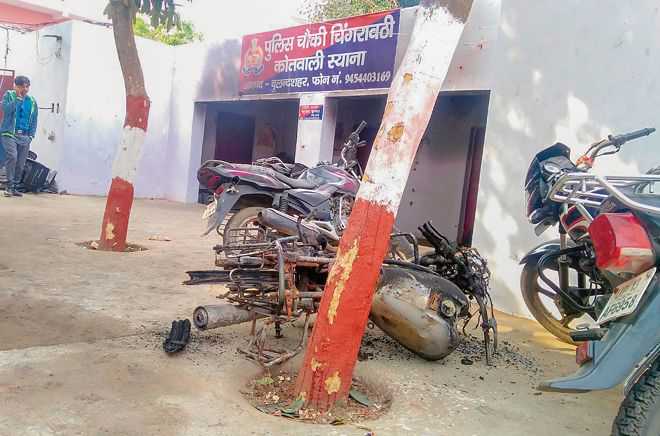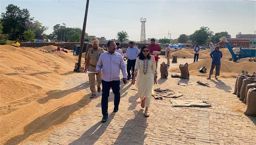
Figures: In India, 383 cops were killed in line of duty from Sept 2016 to Oct 2017.
Sankar Sen
Senior Fellow, Institute of Social Sciences
A valiant police inspector, Subodh Kumar Singh, was killed in the line of duty a few months ago at Bulandshahr in UP. He was allegedly murdered by a mob comprising cow vigilantes when he had gone to control them. Mob violence was directed against Muslim farmers. The perpetrators of the deadly violence against the police officer received a hero’s welcome when they were released on bail by the High Court. A video surfaced showing that one of the perpetrators — a BJP youth wing leader — was garlanded by his supporters with the chanting of ‘Vande Mataram’ and ‘Jai Shri Ram’. The court had granted bail on the condition that the persons released on bail will not try to influence the investigation and the bail bond would be cancelled if they failed to do so.
There is no doubt that the accused persons, whose political leanings and support are known, will try to suborn the witnesses and influence the course of investigation and prosecution.
The contention of the UP Deputy Chief Minister that a mountain is being made out of a molehill and that the Bharatiya Janata Party had nothing to do with the garlanding of the accused persons does not stand the glare of scrutiny.
The release of the accused persons involved in Bulandshahr violence has unnerved family members of the slain police officer. The inspector’s wife has expressed fears about the safety and security of her family. She feels distressed because the killers of her husband, who died serving the motherland, are now being garlanded. Similar apprehensions had been expressed by the son of the inspector upon the release of the accused persons on bail.
In India, the growing increase in the number of attacks on policemen is a matter of great concern and will have disastrous consequences, both in the long and short run. In India, 383 police personnel were killed while performing duty across the country, from September 2016 to October 2017. In the US, 144 law enforcement officers died in the line of duty in 2018.
Earlier, a Bureau of Police Research and Development (BPR&D) study on police fatalities found that 77 per cent of the casualties occur in the rank of upper subordinates and the maximum number who are killed in line of duty are in the age group of 30 to 36 years. Thus, a large number of policemen are getting killed at the prime of their youth. This reflects on their dedication to duty, courage and the sacrifice they make for the country.
Research studies have also shown that police violence and brutality are corelated to the public attitude to the police. Lower public regard diminishes police self-esteem, thereby making the use of force more likely. On the other hand, if the police are trigger-happy and prone to unwarranted use of force, there is a lowering of public regard for the police. Therefore, countries like the United Kingdom and Japan, where the police enjoy high public regard, cases of violence against the police are few.
But in countries like the US and India, attacks on the police are frequent and public regard for the police is brittle and uncertain. In the US, some criminologists speak of the ‘Ferguson effect’ — an idea that increased distrust of police following the 2014 shooting of Michael Brown Ferguson, has increased the crime rate in the US, particularly violent crimes.
Violent attacks on policemen have another very unsettling impact on their outlook and morale. The police develop a siege mentality and a distorted view of the relationship with the society. They also develop a high sense of occupational solidarity and view the world as ‘we’ and ‘they’. Arthur Niederhoffer, an American police officer, describes their view as “Hobbesian — the world becomes a jungle in which crime, corruption and brutality are the normal features of the terrain.”
In many western countries, attacks on the police create a sense of shock and righteous indignation. People are aware of the challenges and hazards the law enforcement officers face and the importance of their work for the maintenance of law and order in society. But in India, attacks on the police evoke no such public response. This happens because such attacks are frequent, and emotion has been blunted by familiarity. The police, in their turn, develop a high sense of occupational solidarity. They feel that when the crunch comes, the police have to defend one and another, and fend for themselves. There will be no hand-holding and no help from outside. They have to stand or fall together. They feel that the people in general do not appreciate their problems and dilemmas.
Again, attacks on the police provoke virulent police aggression. I recall an incident when I was posted as Range DIG of Police in Rourkela, Orissa. A constable on duty was feloniously killed by some criminals when he challenged them on the road. Almost a blind fury gripped the officers and men. It was difficult to restrain them from applying rough and ready justice to the criminals when the latter were apprehended. The occupational solidarity is bolstered by feeling that the people in general are hostile to the police.
One of the reasons for the poor and unsatisfactory performance of duty by the police today is that they are a demoralised lot. Politicisation of the force has wrought havoc. Instances of assault and insult on the police by political leaders and their cronies are being reported from different parts of the country. Neither the police leaders nor political masters come to defend the honour and dignity of the police subordinates, and launch criminal prosecutions against those who attack the police. The upshot is that the police feel demoralised and let down. I recall an incident during my police years in Orissa. A traffic constable was slapped by a VIP with political connections. The range DIG immediately ordered criminal prosecution of the VIP and did not budge, despite political pulls and pressures. The matter was resolved when the VIP apologised to the constable. This had an elevating effect on the police morale. The police officers down the line felt encouraged and energised at the vindication of the honour of one of their comrades.
In a democratic society, the role of the police for law enforcement and order maintenance is of paramount importance. Though the police must function under the oversight of political and judicial authority, their morale and self-esteem must remain unaffected. If the police become the constant target of denigration and violence, they will feel demoralised and their capacity to function as effective guardians of law and order will be eroded. Police inaction will be far worse than police overreaction.



























